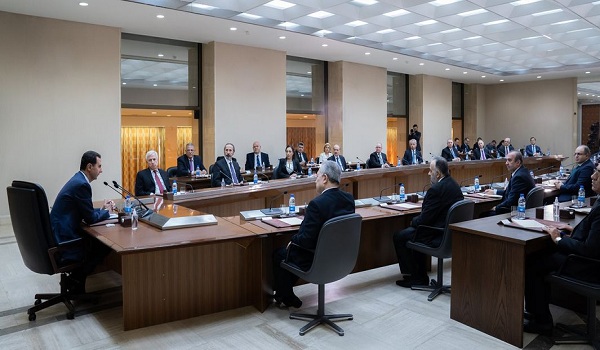President Bashar Al-Assad on Saturday held a meeting with members of the new government, led by Prime Minister, Eng. Hussein Arnous, after they were sworn in.
During the meeting, President Al-Assad stressed that “priority during the previous period was given to restoring security. Today priority is given to production and job opportunities as production is necessary for continuous stability, particularly after most of the Syrian territories have been liberated from terrorism.”
He urged partnership between the government and the people’s commissions and initiatives, as well as individuals and specialists to achieve the hoped for success, because expanding the people’s participation means having more ideas that can reduce efforts and help decision makers reach a solution, calling for adopting transparency as a principle and for sharing information with citizens.
President Al-Assad said that “as a government, the most important point is to specify what challenges we are facing and to try to solve them. As a government we should not accept to restore Syria to the pre-war situation, we should lead Syria to where it should be at this period of time. This can be realized either through government reform or through reforming the state’s institutions which is a task that we have started during the war, through supporting the e-government, digital transformation, e-payment and other electronic services.”
President Al-Assad affirmed the need to distribute authorities, highlighting the role of local administration and stressing the importance of reactivating local councils and engaging them in drawing up development plans and finding solutions to different problems, with the aim of achieving balanced development that involves both the poor and the rich and both the city and the countryside.
 President Al-Assad went on to say that the issue of living conditions in the country is among the most serious challenges facing the government’s work.
President Al-Assad went on to say that the issue of living conditions in the country is among the most serious challenges facing the government’s work.
He pointed out that the Syrian state’s policies have for decades been firm based on supporting citizens, farmers and strategic agricultural crops and on maintaining the public sector, but the work plans for implementing these policies need revision, due to certain gaps.
Therefore, I think, the first task of the government at each ministry’s level is to reconsider and revise the policy with the purpose of developing an implementation strategy that can achieve the set goals of the ministries and the sectors they supervise.
The President also focused on several key points, first of which is the investment law and the need to eliminate the obstacles impeding investment in Syria and to facilitate investment procedures and create an encouraging environment for investment, calling for speeding up electronic services in this domain and urging each ministry to specify how it can benefit from this law in developing its work.
The second point, according to President Al-Assad, is the small and micro-sized enterprises and the law that supports this sector which is very important to boost national economy.
 Moreover, President Al-Assad stressed the need to put standards and clear mechanisms for fighting and controlling corruption and smuggling crimes which massively exhaust the country’s economy, reiterating that fighting smuggling should be a priority of the government’s work.
Moreover, President Al-Assad stressed the need to put standards and clear mechanisms for fighting and controlling corruption and smuggling crimes which massively exhaust the country’s economy, reiterating that fighting smuggling should be a priority of the government’s work.
He affirmed that economic reform depends basically on financial reform, which, in turn, requires tax reform, pointing out that these reforms are necessary to combat tax evasion.
He also underlined the importance of administrative reforms which achieve justice to employees and make benefit from human resources properly.
President Al-Assad said that the sector of renewable energy is new in Syria and it needs a policy and a law to be organized, noting that the People’s Assembly is studying a law on renewable energy that focuses basically on funding projects in this fields.
President Al-Assad highlighted the role of the media in fighting certain concepts that target the Syrian society and that aim at distorting the national concepts of all countries and undermining man’s relation with his homeland and turning him into a person governed by his instincts and interests.
The president affirmed the media’s role in building a bridge between citizens and decision makers and in proposing solutions to different complicated issues.
Earlier, members of the new Syrian government were sworn in before President Bashar Al-Assad.







Hamda Mustafa

